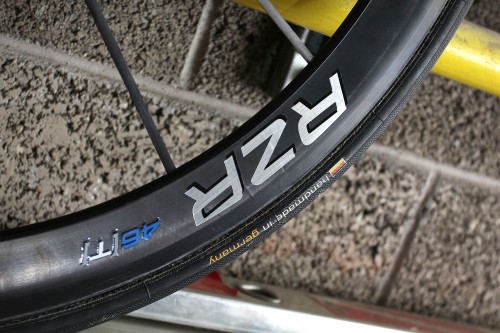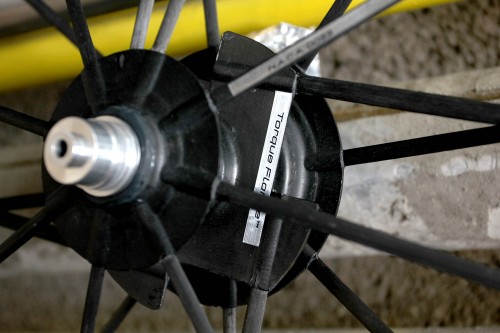- News
- Reviews
- Bikes
- Components
- Bar tape & grips
- Bottom brackets
- Brake & gear cables
- Brake & STI levers
- Brake pads & spares
- Brakes
- Cassettes & freewheels
- Chains
- Chainsets & chainrings
- Derailleurs - front
- Derailleurs - rear
- Forks
- Gear levers & shifters
- Groupsets
- Handlebars & extensions
- Headsets
- Hubs
- Inner tubes
- Pedals
- Quick releases & skewers
- Saddles
- Seatposts
- Stems
- Wheels
- Tyres
- Tubeless valves
- Accessories
- Accessories - misc
- Computer mounts
- Bags
- Bar ends
- Bike bags & cases
- Bottle cages
- Bottles
- Cameras
- Car racks
- Child seats
- Computers
- Glasses
- GPS units
- Helmets
- Lights - front
- Lights - rear
- Lights - sets
- Locks
- Mirrors
- Mudguards
- Racks
- Pumps & CO2 inflators
- Puncture kits
- Reflectives
- Smart watches
- Stands and racks
- Trailers
- Clothing
- Health, fitness and nutrition
- Tools and workshop
- Miscellaneous
- Buyers Guides
- Features
- Forum
- Recommends
- Podcast
TECH NEWS
Just in: Reynolds RZR wheelset
Crikey. Just landed in the office with a barely audible rubbery squeak are Reynolds' flagship RZR wheels. At a claimed weight of under 900g a pair, these really are astonishingly light wheels. Our test set came fitted with Conti tubs so we haven't been able to weigh them naked, but a quick glance at the road.cc scales of truth reveals that even with the tubs fitted they're still only 1400g, which is nothing short of extraordinary.
Also extraordinary is the price, an eye-watering £4,500. High end kit tends to focus rather less on value, and these wheels are certainly pushing that particular envelope. If you're in the market for a set of RZRs then chances are that the performance, not the price tag, is the major concern. Either that or looking the absolute nuts on the sportive start line. Whatever, they ain't cheap. There's about six pairs in the country at the moment, and we're lucky enough to have one of them. So what's so special about them?

The RZRs are the brainchild of Paul Lew, who used to make wheels under his own name (for considerably more than this) before Reynolds came a-calling. They're handmade entirely from Carbon with the exception of a few turny and clicky bits in the middle, and there's some interesting features.

Firstly, the rear hub has three flanges. There's the normal two of course, and then another one directly in line with the centre of the rim that's solely responsible for supplying the drive, which has the benefit of not distorting the wheel under load. All of the spokes in the wheels are attached to the hub and rim with no tension, which Reynolds claims makes the wheels more reliable and easier to service: all the spokes are replaceable (not by you, obviously, but by a white-coated lab guru in Reynolds' airtight facility in space) and if you break one then the rim won't go wildly out of true. The spokes are also designed to an approved airfoil shape to minimise drag.

The rims are designed to work with particular tyre shapes and sizes to create an aerodynamic profile, and they feature a swirl lip generator (a little ridge to you and me) by the spoke bed to break up the air flow behind the rim and stop drag-inducing vortices from forming. All of this is backed up by a technical document that had our eyes glazing over before we'd got a quarter of the way through, suffice to say it's very thorough. The table at the end lists some other wheelsets and the extra power that Reynolds claim you'll have to put in to make up the odds. It's only a couple of Watts if you're already running some expensive Lightweights, increasing as the wheelsets get heavier further down the list.
So does all that tech add up to the perfect wheelset? Well, we don't know yet, but they'll be out on the road in real-world conditions soon, and as soon as we've put them through their paces we'll report back. Stay tuned...
Dave is a founding father of road.cc, having previously worked on Cycling Plus and What Mountain Bike magazines back in the day. He also writes about e-bikes for our sister publication ebiketips. He's won three mountain bike bog snorkelling World Championships, and races at the back of the third cats.
Latest Comments
- AidanR 9 min 58 sec ago
Bloody hell... How are you doing now?
- ktache 18 min 21 sec ago
And I liked endura too. Got a nice long sleeve mostly merino long sleeve a little while back, in orange.
- matthewn5 46 min 24 sec ago
No, the Ebay lights have been around for several years, this Lezyne light just appeared.
- chrisonabike 1 hour 2 min ago
They shouldn't worry - the second part of the "tariff" refrain is "they can make it in US and they'll do very well".
- Mr Blackbird 1 hour 34 min ago
"At the going down of the sun, it will get in our eyes and cause us to crash into things."
- Rendel Harris 1 hour 42 min ago
Been living in the area thirty years now and Brixton Cycles (and local riders wearing their famed Rastafarian colours jersey) has been an iconic...
- chrisonabike 3 hours 47 min ago
Does the "super-loud yellow" also help alert (non-deaf / non-earbud-wearing) pedestrians? Or will it just mean dogs bark at me?
- Festus 4 hours 38 min ago
One thing that bothers me is the use of antidepressant med and driving, it never gets picked up by police. Most of these types of medicines state...
- chrisonabike 6 hours 38 min ago
Indeed - but again these are perhaps questions we should keep asking. Even if the immediate answer is "well we are where we are" or "how on earth...









Add new comment
8 comments
I'd love to ride these, to see what they're like.
But I can't ever imagine actually buying wheels which don't have aluminium rims and steel spokes. Did you read what Cadel Evans said about his wheels in the Giro yesterday? First corner he applies the brakes and nothing happens - second corner both wheels lock up - carbon fibre rims in the rain. And carbon fibre spokes give me horrible visions of suddenly riding on a cloud of disintegrating CF shards on a big descent.
I'm reading BikeSnobNYC's book, and it appears that I have retro-grouch tendencies!
Why spend 4.5K on a pair of these wheels when the lew wheels that these are based on were prone to problems and you can build a sub 800 gram wheel using edge rims and extralite hubs for less than 2k.
I think Reynolds have lost the plot with this project.
are they strong as well as light? in respect of the kind of road surfaces we get in this country, (holes bumpy and generally crap) as compared to the smooth european asphalt and the like..
i guess mat will find out, one way or the other
There's more here:
http://www.theworldslightestwheel.com/
and i've attached the white paper PDF
RZR_no1_white_paper-3.pdf
All the science is available on tech white papers @ http://www.reynoldscycling.com/index.php?p_resource=articles
seems to me that from basic engineering principles, spokes must either be under tension (like normal wheels) or very rigid (like tri-spokes and the like). given that these appear to be neither of the above, i don't remotely understand how these wheels don't flop all over the place. go on, put some of their science up online....
Ah! Next week's Schwag! I'll get my name in the hat RIGHT NOW!